- Home
- Patricia McCormick
Cut Page 5
Cut Read online
Page 5
“Oh, child,” Ruby says when she sees me. “Oh, honey child.”
She goes into action, reaching up to the First Aid cupboard and taking my hand in hers, all in one swift motion. She unwinds a roll of gauze, wipes away the blood, then washes the cut with some kind of solution. It burns, but for a moment at least, the throbbing lets up. I can see then that the cut isn’t that deep, that it’s no worse than the others, and I wonder why it bled so much, why I showed it to Ruby.
“It’s a bleeder,” she says, pressing a square of gauze to the cut. “But it’s not deep. No need for stitches.”
She closes both her hands around my wrist, as if she were praying, and pulls them to her chest, so close I can feel it rise and fall as she breathes. She presses with such a sure, steady force that after a while the bleeding stops and the pain begins to drain away.
She lowers my hand finally, puts another bandage over the cut, wraps gauze around my wrist with a dozen or so quick twists, and secures it with a couple of pieces of tape. We stand there a minute regarding her work. Then Ruby lowers herself into her chair, using one arm to support her weight. She drops into the chair with a sigh.
My body feels light all of a sudden, so light it might float off. I imagine myself as a giant Macy’s Parade balloon, floating up, away from Ruby’s desk, high over Sick Minds. I have to sit down.
Ruby leans forward, takes my hands in hers, and pulls them into her lap.
“Scared yourself, did you?” she says.
In the brown-black center of Ruby’s eyes is a tiny, scared reflection of me.
“Why do you want to do a thing like that?” Our hands—ashy white and deep mahogany—are intertwined in Ruby’s lap, the fabric of her dress soft from so many washings.
“Hmmm?” she says, as if I’d said something she hadn’t quite heard. “Why don’t you tell us what’s bothering you?”
I consider pulling free of her grasp, but it would take too much effort and I’m tired now, very tired.
Ruby sighs. “Whatever it is, baby, it can’t hurt worse than this.”
Ruby walks me back to my room, her arm around my waist. This time, there’s no question of how much distance to keep between us; I let myself sink against her. She tells me I’m lucky, that the cut wasn’t deep, that I might have to get a tetanus shot, and that she’ll have to file an incident report. “Standard operating procedure,” she says. It occurs to me that I could be sent home or to Humdinger, and I wish Ruby would tell me one of her home truths or even just what standard operating procedure is, but when we get to my room she seems distracted. She lets go of my waist, reaches into the closet, and pulls out one of the nightgowns my mother bought.
“Put this on, child,” she says. “And give me those clothes to wash. I’ll be right out here waiting.” She steps out into the hall.
I change into the nightgown, gather up my clothes, and start walking to the door to give them to Ruby. Something holds me in place halfway between the bed and the door, some vague sense that that I’m forgetting something. Then I walk back to the bed, pick up the two jagged pieces of the pie plate, turn, and bring them to Ruby.
The green neon numbers on Sydney’s alarm clock say 6:04 a.m. Last time I checked, it was 5:21. I brace myself on my arm and a dull pounding starts in my wrist. There, at the foot of the bed, is a neat bundle of clean, folded clothes. Ruby must have put them there before her shift ended.
I push back the covers, get up quietly, put on my clothes, and slip into the still-dark hallway. I tiptoe toward the bathroom, sneak past Marie’s empty chair, past the phone booth, past the new girl’s room, past the dayroom, the Group room, down the hall, past the Emergency Use Only door, until finally I’m sitting outside your office waiting for you to come to work.
I don’t know how long I’ve been sitting here, but finally you’re standing in front of me in your blue coat and scarf. You don’t look surprised. You don’t even say hello right away. You pull your keys out of your purse, bend down and turn on the UFO outside your door, and say, “Would you like to come in?”
I take my usual place on the couch while you hang up your coat and scarf, put your purse in a drawer, open the blinds. Finally you sit down.
“Callie?” you say. “Is there a reason why you’re here?”
I shrug.
“Can you tell me what’s on your mind?”
I start counting the stripes in the wallpaper. A dog barks in the distance. The sound rings in the air for a long time, then it’s quiet.
“I can’t.” My voice surprises me. It’s so puny.
“What? What is it you can’t do?”
I clear my throat, but it doesn’t do any good. Now there’s no voice in there at all. I shrug.
“Callie.” Your voice is firm. “Try to look at me.”
I sneak a peek at you. Your eyes are amber. Like Linus’s. I look away.
“What is it you can’t do?”
The radiator clicks on, drones for a while, clicks off.
“Talk.” The word, finally, comes out of my mouth.
Your chair groans and I notice then that you’ve been sitting on the edge of your seat. You lean back and tap your lip with your finger, the way you did the other night in the game room.
“Is it because you’re scared?”
I trace a square on the couch, nod yes, once, and watch, stunned, as a tear makes a small dark circle on my jeans.
You slide the tissue box across the carpet to me.
“Do you know why you’re scared?”
I shake my head.
“Callie.” Your voice comes at me from far away. “I think if we work really hard together, we may come up with some answers.”
I rip the tissue in my hand. It’s become a soggy useless mess. I grab another one.
“Would you like to try?”
I nod.
“Good.” You sound pleased, really pleased.
I blow my nose. “What will you do to me?” The words seem to come out on their own.
You smile; tiny wrinkles fan out around your eyes and I wonder if maybe you’re older than I thought. “To you?I won’t do anything to you. We’ll just talk.”
“That’s it?” My voice cracks. It’s a weak, unreliable thing.
“That’s it.”
I grab another tissue from the box. “I feel …” I clear my throat and will the words to come out. “I feel like I’ll be losing.”
“Like a game or a contest?”
“Uh-huh.”
“What do you think you’ll lose?”
“I don’t know.” I check your amber cat eyes for signs of impatience, but you don’t seem mad. Just curious.
“I’ll never make you tell me anything you don’t want to tell me,” you say. “But you are right, Callie. Sometimes it will feel like you’re losing something.”
I reach for another tissue. Wet, wadded-up tissues keep piling up in my lap.
“But Callie,” you say. “If we work hard, you’ll find something much better to take the place of whatever you give up. I promise.”
I nod. I’m tired now, awfully tired. I’ve got that headachy feeling I get in the summer when I step out of the dark, air-conditioned house into the too-bright sunlight.
I watch you as you stand up and say we’ll get started later on, at our usual time. Then you call for someone to escort me to the infirmary, where they give me a tetanus shot and make me sign a form. Then I go back to my room. And even though it’s still morning, I go back to bed. And sleep. And sleep.
II
I must’ve slept all morning, because the next thing I know, Marie is shaking my shoulder and saying something about lunch. “C’mon,” she says. “The doctor gave you special permission to be in your room unattended today, but now you’ve got to get up. Or else you’re going to miss lunch.”
I don’t understand. Then it comes back to me, dimly at first, that something’s different, although I can’t remember exactly what it might be. I brush my hair out of my eyes and see a
flash of white gauze around my wrist. In an instant, everything—my fingers gripping my wrist, Ruby folding her hands over mine, wet tissues heaped in my lap—comes back to me.
“We don’t want you missing your meals,” Marie says. She lowers her voice. “We got enough skinny girls in this place already.”
I sit up and realize I’m hungry, really hungry.
Even the noise and the steamed-vegetable smell of the cafeteria doesn’t spoil my appetite. I pick up a tray and let a cafeteria worker with fogged-up glasses shovel a grilled cheese sandwich onto my plate. I remember Sydney calling them chilled grease sandwiches once and I head out of the food line hoping she’ll be there.
But the dining room is practically empty; the only ones left at our table are Debbie and Becca I grip the edge of my tray and imagine myself walking past my usual seat at the end of the table, sitting down next to Debbie. I’ll give her a practice smile, the way Ruth did, and start talking, like everybody else does. Debbie will say, “That’s great, that’s really great,” the way she does when Becca eats all of her fruit and cottage cheese, and Becca will be impressed, she’ll agree with Debbie that it’s great, and when we go to Group later on, she’ll run ahead and tell everyone the news. But before I even get to the table, they’ve left.
A few minutes later, Tara comes in and sets her tray down at the other end of the table. Her nose is red and her face is blotchy and as soon as she sees me watching her she pulls the brim of her baseball cap down. She picks up a piece of lettuce and wipes the dressing off with her napkin.
Finally I stand and pick up my tray, keeping my sleeve pulled down over my wrist, the hem wrapped around my thumb, and sit down across from her.
“Hi,” she says.
I try to give her a practice smile, but I’m not sure anything happens on my face.
Then we both sit there pretending to eat. I try to remember how people start conversations, but all that comes to mind are phrases from sixth-grade French. “Bonjour, Thérèse. Ça va?” says Guy, a boy wearing a black beret. “Ça va bien, merci. Et tu, Guy?” Thérèse responds.
I decide to take a sip of water and then just say hi. Hi. It’s just two little letters. I ought to be able to get that much out. I reach for my glass. My sleeve creeps up and we both see the white bandage sticking out. The water in my glass jumps as I pull my hand away and tuck it safely in my lap.
“Oh,” is all she says.
I peek out at her from under my bangs.
“You really don’t understand, do you?” Her voice is gentle, the way it was in the bathroom the day she asked if I wanted her to leave me alone.
I shake my head.
“We all do things.”
“Where would you like to start?” you say that afternoon.
I notice that you’re wearing your delicate little fabric shoes again today.
“Callie? Why don’t you tell me about things before you came here?”
“Don’t you—” My voice deserts me. “Don’t you know?”
You tap your pen against something in your lap; I see then that you didn’t throw my file away after all.
“No,” you say. “I don’t. All this tells me is what other people have to say about you.”
I squint at the folder, wondering who these other people are and what they have to say.
You open the folder, then close it. “That you’re fifteen, a runner—”
“Was.”
“Pardon me?”
“I was.” I cough. “A runner.”
You pick up your pen.
“Are you going to write everything down?”
“Not if you don’t want me to.” You hold your pen in midair. “Will it bother you if I take notes?”
I shrug.
“If it bothers you, I won’t.”
For some reason, I think of how Mr. Malcolm, my algebra teacher, used to hand out test paper with lots of blank space and tell us we wouldn’t get credit for right answers unless we showed our work. I imagine you working on me as an algebra problem, reducing me to fractions, crossing out common denominators, until there’s nothing left on the page but a line that says x = whatever it is that is wrong with me. You fix it. I get to go home.
“Would you rather I didn’t take notes?”
“It’s OK.” You bend over your notepad a little; I study the part in your hair, which is perfectly straight and tidy You straighten up. “So, where do you want to start?”
I shrug.
You wait.
“I don’t care,” I say.
You cross your legs, not taking your eyes off me. The minute hand on the clock twitches forward once, then once more.
“My little brother, Sam,” I say finally. “He’s the one who usually gets all the attention from doctors and stuff.”
Instantly, this sounds wrong.
“I don’t mind,” I say. “He’s sick.”
“What’s the matter with Sam?”
“Asthma.”
You don’t say anything.
“Really bad asthma.”
You don’t move.
“He’s in the hospital all the time.”
You still don’t move.
“That’s why he’s so skinny and why we have to keep everything clean. But he’s OK for a brother.” I know I’m supposed to say more, but I’m exhausted, out of words. “That’s all, I guess.”
You fold your hands in your lap. “What’s that like for you?”
“What?”
“Having a brother who needs so much attention.”
“I’m used to it.”
You open your mouth to say something, but I cut you off.
“My mom’s the one who has a hard time.”
“Your mom?”
“She worries a lot.”
“What does she worry about?”
I try to get comfortable on the couch. This is tiring, all this talking.
“Callie,” you say. “What does your mother worry about?”
“Everything.”
You look like you want to ask something else, so I go on.
“She doesn’t drive anymore. She’s terrified of trucks. My dad has to take us everywhere.”
“I see.”
I wonder if you do see, see us sitting in the car, strapped in our seats, the windows rolled up tight, even if it’s a nice day, especially if it’s a nice day, so no pollen or spores or dust mites or pollution or anything can get into our car, our quiet, antiseptic car.
“Can you tell me about that?”
“About what?”
“About the times Sam was in the hospital.”
I blink. Were we talking about the times Sam was in the hospital? Or did you say something and I missed it? I pinch the edge of my bandage, tugging ever so slightly A single, sterile white thread comes unraveled.
“Like what? What do you want me to tell you?”
“Well, what do you do when your parents are with Sam?”
I roll the thin piece of thread into a tiny, tiny ball.
“I don’t know. Clean.”
You don’t say anything. The ball is microscopic now.
“I dust. Wash things. Vacuum. We have to vacuum a lot.”
You still don’t say anything. The ball is so tiny I lose it.
“Clean the lint filters. We have special filters on all the air vents because of Sam. One time I organized all my mom’s coupons. That’s it. Boring stuff.”
There’s a long silence. I feel around for the ball, listen to the hum of the UFO, check the clock.
“Sometimes if they have to stay over, I watch TV.”
“What do you watch?”
“Um. I don’t know. The Food Channel.…Rescue 911.”
“Why do you like those shows?”
“I don’t know.”
The minute hand lurches forward again while you wait for me to come up with a better answer.
“Rescue 911 …” you say. “Is there something in particular you like about that show?”
I
shrug. “No.” Then, “Yeah, I guess. I don’t know.”
You raise an eyebrow.
“I guess it’s because … I guess usually when people get saved it’s because some little kid is the one that notices that something’s wrong. Or the dog. Or a neighbor.”
You write something in your notebook.
“There’s always a happy ending; after the person gets rescued, everything turns out OK.”
I listen to the traffic, far away, on the highway and I study a crack in your ceiling. Like the crack in the ceiling of the hospital where Madeline went to have her appendix taken out, this one also has the habit of sometimes looking like a rabbit. I rhyme habit and rabbit in my head over and over until I can’t tell which came first—the habit or the rabbit.
“How long has Sam had asthma?”
Your voice startles me. I’d almost forgotten you were there.
“What?”
“When did Sam develop asthma?”
I jump, the way I always did at a track meet when the ref would cock the starting gun and yell, “On your mark.”
“Callie?”
My thigh muscles are twitching, my feet are sweating. I press my hands to my thigh legs to still them. It’s no good. “A year ago, maybe a little more.” I try to sound casual, bored even.
“A year ago,” you repeat.
I slide forward on the couch, ready to go.
“And while your parents were at the hospital, who took care of you?”
I’m sitting on the edge of the couch now. “I take care of myself.”
You uncross your legs, cap your pen, and say I did good work. I check the clock. Our time was up five minutes ago.
On the way back from your office I pass the dayroom. The TV voice of a talk-show host competes with the tick-tock of a Ping-Pong game. I tuck my head down and slink by. As I pass the door, a tiny white ball skitters out into the hallway and rolls to a stop at my feet.
“Hey, S.T.,” Sydney calls out. “Bring it here, will you?”
I consider the ball at my feet, then Sydney’s flushed, happy face.
“Please?” She smiles a wide smile.
I bend and pick it up. It’s like picking up air, it’s so light. I take baby steps across the hall, then into the day-room, eyeing the ball every second, watching it wobble back and forth in my open palm, waiting for it to fall out of my hand and bounce down the hall, out the front door.

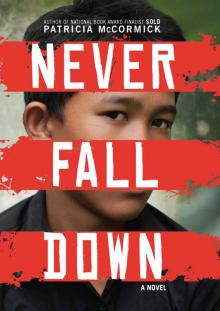 Never Fall Down
Never Fall Down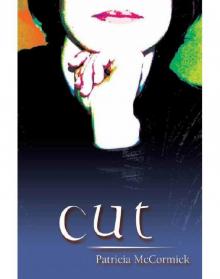 Cut
Cut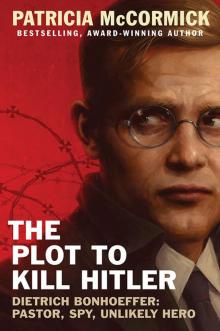 The Plot to Kill Hitler
The Plot to Kill Hitler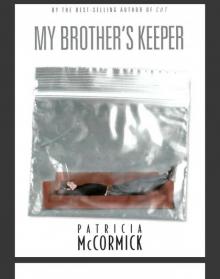 My Brother's Keeper
My Brother's Keeper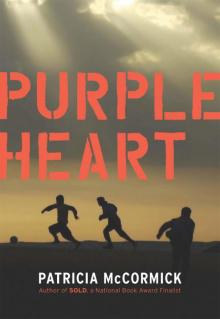 Purple Heart
Purple Heart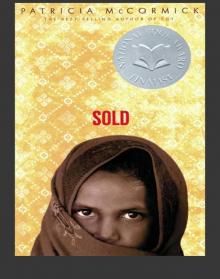 Sold
Sold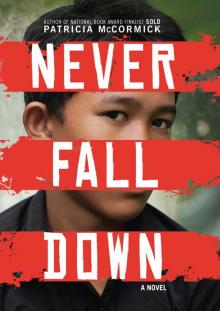 Never Fall Down: A Novel
Never Fall Down: A Novel